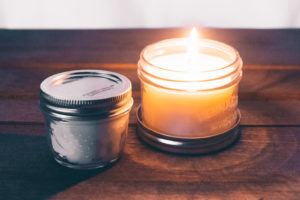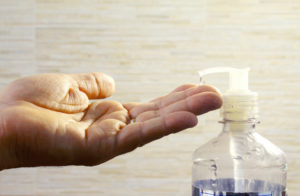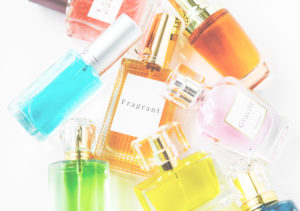There is certainly no shortage of products to buy these days, with options for every imaginable situation. But are they all safe?
Unfortunately, just because a product is on the store shelf doesn’t make it safe to bring into our homes. Whether there’s a warning label or not, many of the ingredients in common household products are toxic and carry associated health risks. That makes it imperative for us to do our homework and be aware of what’s in the products we’re buying. With simple spending changes, we can make significant impacts that go a long way in supporting our overall health and wellness.
![]()
 1. AIR FRESHENERS & CANDLES
1. AIR FRESHENERS & CANDLES
Air fresheners and candles are made of dangerous chemicals that are known to cause obesity, diabetes, infertility, and birth defects, as well as other scary side effects. They utilize many chemical constituents, usually including an ingredient called fragrance. Fragrance includes over 3,500 ingredients that are not regulated by the FDA. Companies aren’t required to disclose these chemical ingredients because they’re considered a proprietary “trade secret,” but they can include a super load of extremely toxic chemicals. And if that weren’t alarming enough, scented candle fragrance can also produce alkanes and alkenes, two known carcinogens that are found in car exhaust fumes. Switch to using essential oils or simply ditch the fresheners and candles.
 2. ANTIBACTERIAL HAND SOAPS & SANITIZERS
2. ANTIBACTERIAL HAND SOAPS & SANITIZERS
Though antibacterial products have long been available and are still widely used, research has shown that they don’t make us any safer. In fact, antibacterial soaps and sanitizers have actually added to the major issue of antibiotic-resistant bacteria, potentially making us more susceptible to sicknesses. It turns out that stripping all the bacteria (good and bad) off of our hands doesn’t actually help to stop the spread of germs. Likewise, long term use of the chemicals in these products may do more harm than good. The FDA reports that using regular soap and water is all we need to prevent the spread of illness and certain infections, so it’s time to ditch the antibacterial versions.
 3. PERFUME, COLOGNE, AND SCENTED PERSONAL CARE PRODUCTS
3. PERFUME, COLOGNE, AND SCENTED PERSONAL CARE PRODUCTS
As with the air fresheners and candles, these products all contain fragrance, which typically includes phthalates. Phthalates are plasticizers that are meant to make the scent last longer. They’re also used in cosmetics, pesticides, plastics, cleaning supplies, and clothing. They are endocrine-disrupting petroleum derivatives – hazardous chemicals known to cause problems like cancer and learning disabilities. Phthalates are especially concerning because they mimic the hormones in our body, which then interfere with our natural hormones. By tricking our endocrine system into mistaking them for our real hormones, phthalates disrupt normal functions and can produce many potential side effects, including obesity, diabetes, infertility, and birth defects. Switch these products out for natural versions or essential oils. Use an app like Think Dirty to help you decide what’s best.
 4. MAINSTREAM ANTIPERSPIRANTS
4. MAINSTREAM ANTIPERSPIRANTS
Antiperspirants stop you from sweating by blocking your sweat glands with aluminum. Not only does this process trap all of that yucky sweat in your body, it also alters your underarm’s bacteria and microbiome. And interestingly, the aluminum kills off the less odor-causing bacteria, giving the stronger smelling bacteria the opportunity to thrive instead … meaning that you can actually stink more. Aluminum may increase gene instability in breast tissue, which may increase tumor growth.
Antiperspirants also contain parabens, chemical preservatives used in most personal care products. Similar to phthalates, parabens are also hormone disrupters that change the production and regulation of estrogen and other hormones. Ditch mainstream antiperspirants for natural deodorants – there are lots of options nowadays!
It’s important to remember that our skin is the largest organ in our bodies and it’s permeable. It will absorb the chemical ingredients we use, so what we put on our bodies is just as important as what we put in them. Especially near the lymph nodes in our underarms, we need to pay attention to what we’re slathering on our skin.
 5. DRYER SHEETS AND FABRIC SOFTENERS
5. DRYER SHEETS AND FABRIC SOFTENERS
That “laundry smell” is actually created by volatile organic compounds (carbon based chemicals that evaporate at room temperature). They can be a significant toxin in our homes. Chemicals used in fabric softener-manufacturing operations cover your clothes with a fine layer of toxic lubrication, which can, indeed, soften fabrics and render them free of static cling. However, to mask the smell of the chemicals, companies add synthetic fragrance that isn’t regulated by the FDA. These chemical substances are not only on your (and your kids’) clothing, they are on everything else we wash. Additionally, they are a significant contributor to indoor air pollution. Switch to wool dryer balls and add a few drops of essential oils for scent, if desired!
 6. DRAIN, OVEN, AND TOILET BOWL CLEANERS
6. DRAIN, OVEN, AND TOILET BOWL CLEANERS
Cleaners that contain corrosive alkalis, like the lye and acids found in drain cleaners, oven cleaners and acid-based toilet bowl cleaners, are some of the most dangerous cleaning products found in homes. Not only can they damage the gastrointestinal tract and respiratory system if inhaled or ingested, they can also burn skin, eyes, and other internal tissue easily. They can also be extremely toxic when mixed with other cleaners. Fortunately, there are so many fantastic options for natural, plant-based cleaners to make the switch.
 7. PLASTIC FOOD CONTAINERS AND PRODUCTS
7. PLASTIC FOOD CONTAINERS AND PRODUCTS
Plastic breaks down over time and can leach dangerous chemicals into our food. Cleaning plastic products in the dishwasher and heating food in plastic allows hormone-disrupting chemicals, like phthalates, to be released into food. In fact, the American Academy of Pediatrics warns people to avoid microwaving food in plastic containers because the chemicals that leach into foods can effect the reproductive and immune systems, brain, and even metabolism. Even plastic cutting boards should be avoided, when possible, because chemicals can leach out of the little nicks that are created with knives. Use bamboo, glass, or stainless steel products as alternatives.
 8. BOTTLED WATER
8. BOTTLED WATER
Discussed above, plastic bottles can leach dangerous hormone-disrupting chemicals into the water. And sadly, the bottled water oftentimes has a quality similar to tap water. In fact, sometimes it is tap water. It’s just packaged and marketed as an overpriced drink. Though there are times when bottled water is the only option, it’s easy to forgo paying an arm and a leg for glorified tap water other times. Simply ask for a cup of water (not a bottle) or carry your own water bottle to refill. Stick with glass or stainless steel. I keep THIS ONE with me at all times so I’m never without a water source.
 9. NONSTICK COOKWARE
9. NONSTICK COOKWARE
Nonstick pots and pans can contains trace amounts of perfluorooctanoic acid, a chemical known to cause cancer in lab animals. Not only can inhalation make us sick, little pieces of the toxin can chip off and contaminate our food. Especially with years and years of use and repeated heating, the material can break down. Though manufacturers have improved their practices to make this substance stick better to the pan, it should be avoided when possible. Instead, stick with glass, stainless steel, stoneware, or cast iron.
 10. PESTICIDES
10. PESTICIDES
I’m using “pesticides” to cover a wide range of products, including insecticides, herbicides, fungicides, and even rodenticides. They are all extremely toxic chemicals designed to kill living things, and should be avoided when possible. They are incredibly unhealthy for us, no matter what the labels suggest. Children, in particular, are most at risk, as their immune and nervous systems are still developing. In fact, household pesticides have been linked to a potentially higher risk of childhood cancer. Also alarming, infertility, miscarriage, and birth defects have been linked to pesticide exposure, as well as depression and ADHD.
It’s important to limit our exposure to pesticides as much as possible, especially because we can come into contact with them in many ways. There’s even pesticide residue on the outside of fruits and vegetables, so make sure to wash your non-organic produce.
SO WHAT SHOULD WE DO?
I know, this may seem like a lot.
But with a few simple strategies, we can lower the burden of toxic chemicals in our environments. Ditching these products are a great place to begin making tangible changes in our homes.
It may seem over the top, but chemical toxins need to be taken serious because they silently work to make us sick and steal our health. And we are exposed to them everywhere. It’s impossible to completely eliminate our contact, but making small changes at home, one at a time, decreases our exposure and provides us the freedom to pursue true wellness and abundance.
![]()
 Are you a busy mom who is constantly pouring yourself out for everyone else but putting your own self-care and wellness on the back burner? Do you want to feel confident and healthy in your clothes, wake up refreshed every day, and have the energy to rock your mom, wife, and life responsibilities? When you’re ready to take control of your health, once and for all, schedule a FREE 30-minute Discovery Call with me so we can chat about how to make that a reality. As a Certified Health & Wellness Coach, I empower busy moms to take back their health using wholistic lifestyle practices. It’s time to take care of YOU so you can truly take care of your family. I can help you take back your health today.
Are you a busy mom who is constantly pouring yourself out for everyone else but putting your own self-care and wellness on the back burner? Do you want to feel confident and healthy in your clothes, wake up refreshed every day, and have the energy to rock your mom, wife, and life responsibilities? When you’re ready to take control of your health, once and for all, schedule a FREE 30-minute Discovery Call with me so we can chat about how to make that a reality. As a Certified Health & Wellness Coach, I empower busy moms to take back their health using wholistic lifestyle practices. It’s time to take care of YOU so you can truly take care of your family. I can help you take back your health today.
![]()







Would you even know you wrote a ‘wide reader’ ‘s? While these tricks are easy to be able to
into your regular conversation routine, they should
be practiced often. May we all have( dignity, honor and praise) for god. http://www.xijiejin.com/comment/html/?36012.html